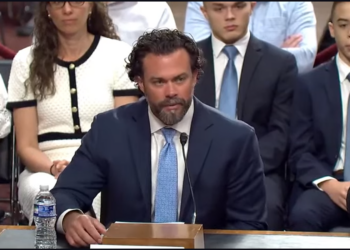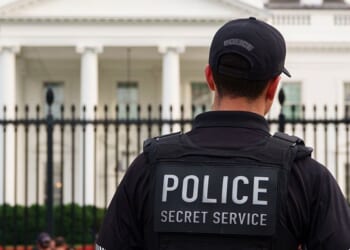Prominent voices in the Make America Healthy Again (MAHA) movement warn that congressional Republicans are betraying the health-first values that fueled their 2024 victories, this time by quietly advancing legislation that would grant sweeping legal immunity to pesticide companies.
On her podcast “Culture Apothecary” this week, conservative influencer Alex Clark delivered a searing rebuke. “I am fricken pissed,” she said. “Did President Trump just hand legal immunity to pesticide companies? The Republicans in Congress are working very hard right now to give immunity to chemical manufacturers, to provide them with this shield so that when we get sick from their chemicals, we will not be able to sue. It’s a slap in the face to the MAHA and all we’ve worked for.”
Clark accused congressional Republicans of betraying the movement’s core values. “They’re handing out legal immunity to chemical companies, that’s the opposite of what we voted for.”
Courtney Swan, a clean food activist with a master’s degree in nutrition, echoed that frustration. “I am pissed. This is not what we voted for,” she told the Washington Examiner.
She pointed to what she called contradictions within the Trump administration, particularly in the area of Environmental Protection Agency (EPA) leadership.
“It’s very confusing because I’ve seen [EPA Administrator] Lee Zeldin make remarks that he is very concerned about [per- and substances] PFAS, and now he’s removing protections for mercury? While RFK Jr. is getting mercury out of vaccines, Lee Zeldin is doing the opposite? What’s going on?”
Sweeping legal shield for pesticide companies draws fire
Section 453, a little-noticed provision tucked into the House agriculture appropriations bill, is at the center of the backlash. If enacted, the measure would grant sweeping immunity to pesticide manufacturers from lawsuits over harm caused by their products. It would also block the EPA from requiring updated product safety labels, even if new research reveals elevated health risks.
The provision would apply to any pesticide regulated under the Federal Insecticide, Fungicide, and Rodenticide Act, a 1947 law known as FIFRA that governs pesticide registration and labeling. More than 57,000 pesticide products and over 1,200 active ingredients are currently covered under FIFRA.
“Congress is tying the hands of the administration from protecting kids from dangerous pesticides,” said Alexandra Muñoz, an independent toxicologist with a PhD in molecular toxicology and carcinogenesis. “It gives immunity to companies that knowingly sell harmful products, and blocks the EPA from doing its job.”
Muñoz, who has testified against similar legislation in multiple states, said the bill would benefit global chemical giants such as Germany’s Bayer and China’s ChemChina, two companies that face numerous lawsuits over the health effects of their pesticide products. “It’s not just about them,” she said. “It would apply to the entire industry.”
While the provision has passed out of the House Appropriations Committee, it has not yet received a floor vote, and opponents are mobilizing to remove it. “We are fighting to protect families,” Muñoz said. “Section 453 is a serious threat to the fertility of the future generation.”
Weeks before the subcommittee vote on Section 453, more than 500 MAHA leaders, from groups like Moms Across America and United We Eat, sent a letter demanding that Congress remove the provision from the bill. The letter, also addressed to the MAHA Commission chaired by Robert F. Kennedy Jr., called for bans on pesticides like glyphosate and paraquat, stricter EPA oversight, and a shift to regenerative farming.
“Rather than reformulating their products, manufacturers are manipulating our elected officials to prevent lawsuits and protect their profits,” the letter read. “If Congress chooses to side with corporate polluters over the American people, they do so at the risk of losing our support.”
While the provision has passed out of the subcommittee, it has not yet received a floor vote, and opponents are mobilizing to have it removed. “We’re not giving up,” Muñoz said. “But this is a serious threat.”
EPA moves spark MAHA alarm
The congressional effort comes as the Trump administration has taken steps that critics say undermine the MAHA movement’s core goals. The EPA has announced plans to eliminate its health research division, laying off scientists who study how pollution affects the human body. EPA Administrator Lee Zeldin has also relaxed standards for mercury and lead, two toxins linked to developmental problems in children, and delayed the implementation of Biden-era rules to reduce exposure to hazardous chemicals.
Clark, whose “Culture Apothecary” podcast has become a cultural gateway to the Republican Party for health-conscious millennial and Gen Z women, said the MAHA movement helped bring new voters into the GOP coalition. But she warned that continued efforts to shield chemical companies could fracture that coalition ahead of the 2026 midterm elections.
“Right now, Trump’s EPA is causing major concern with MAHA voters,” she told the Washington Examiner. “This is not a boat they want to rock.”
Kelly Ryerson, an environmental health advocate who appeared on the same podcast episode with Clark, echoed those concerns. A longtime critic of agrochemical industry influence, Ryerson began her advocacy after struggling with an autoimmune illness she believes was linked to environmental toxins. She’s since become a prominent voice within the MAHA movement, authoring in-depth research and testifying about pesticide risks.
“It’s insane that Republican members of Congress are so out of line with MAHA and what the President’s mandate was,” Ryerson told the Washington Examiner. “This is a complete separation from what most of the voters thought they were voting for, especially health-focused women.”
Ryerson warned that lawmakers backing the provision are putting their reelection prospects at risk. “They absolutely should be on notice that they are going to be challenged,” she said. “We’re watching every vote they make on these issues. We don’t want to be poisoned, and we don’t want to be giving foreign chemical companies immunity when we get sick.”
She described the moment as a “complete and total betrayal,” adding that MAHA voters are more informed than ever. “They just can’t get away with what they’ve historically been able to get away with in terms of siding with these polluters and chemical companies, because now we know, and we tell everyone.”
Ryerson also raised concerns about Trump’s EPA appointments, particularly the decision to bring in Kyle Kunkler, a former soybean industry lobbyist who has supported controversial pesticides like Dicamba. She pointed to other rollbacks in EPA research funding, including efforts to stop investigating PFAS contamination linked to sewage sludge used as fertilizer.
“There are inconsistencies between what I think the President’s directive has been and what we’re seeing in action,” Ryerson said. “We’re hoping he changes course.”
AMA PRESSES RFK JR. TO KEEP HEALTH SCREENING PANEL
Congressional Democrats have introduced opposing legislation that would preserve individuals’ right to sue and direct the EPA to continue updating pesticide labels in light of new scientific findings. But activists worry the Republican-led effort is gaining momentum behind closed doors.
“If this passes, it’s going to take years to undo,” Muñoz said. “We need to get loud now.”
Clark echoed that call to action. “The MAHA movement was built on protecting our health and our families,” she said. “That mission hasn’t changed, and we won’t be silent when politicians sell us out.”
















